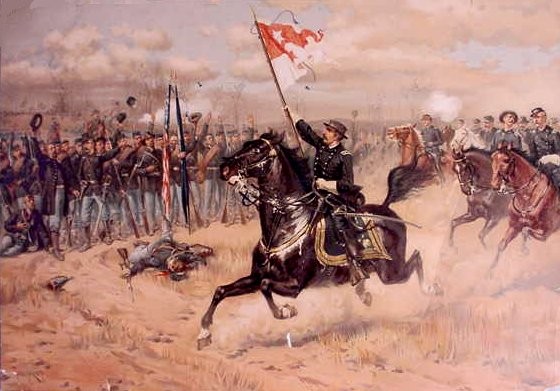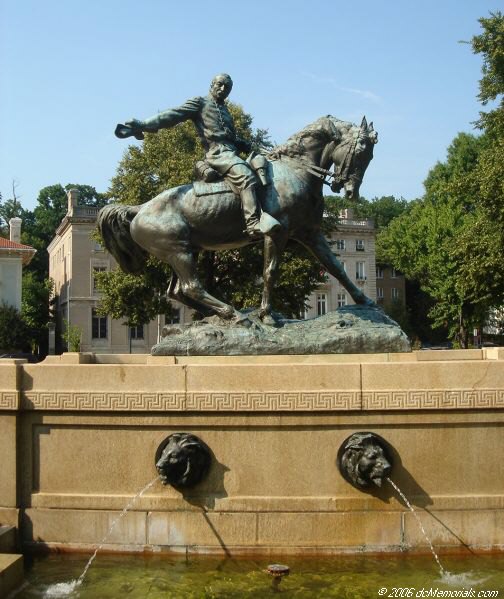October 19, 2007
Gratuitous Civil War Geek Posting (TM)

(Reposted from last year. Deal with it. I've added a bit more to the end.)
Today is the anniversary of the Battle of Cedar Creek, the last major battle of the 1864 Shenendoah Valley campaign, in which Jubal Early launched an unexpected assault against the Union army. The Union forces, caught flatfooted, had begun to pull back in panic when they were rallied by Gen. Phillip Henry "Little Phil" Sheridan, who on hearing the battle break out had quickly ridden forward from his headquarters at Winchester. Sheridan rallied the Union troops and, toward the end of the day, launched a counter-attack against the Confederates that pretty much wiped out Early's army as an effective fighting force.
News of Sheridan's ride quickly inspired the following poem by Thomas Buchanan Read, entitled (not surprisingly) "Sheridan's Ride":
Up from the South, at break of day,
Bringing to Winchester fresh dismay,
The affrighted air with a shudder bore,
Like a herald in haste to the chieftain's door,
The terrible grumble, and rumble, and roar,
Telling the battle was on once more,
And Sheridan twenty miles away.
And wider still those billows of war
Thundered along the horizon's bar;
And louder yet into Winchester rolled
The roar of that red sea uncontrolled,
Making the blood of the listener cold,
As he thought of the stake in that fiery fray,
With Sheridan twenty miles away.But there is a road from Winchester town,
A good, broad highway leading down:
And there, through the flush of the morning light,
A steed as black as the steeds of night
Was seen to pass, as with eagle flight;
As if he knew the terrible need,
He stretched away with his utmost speed.
Hills rose and fell, but his heart was gay,
With Sheridan fifteen miles away.Still sprang from those swift hoofs, thundering south,
The dust like smoke from the cannon's mouth,
Or the trail of a comet, sweeping faster and faster,
Foreboding to traitors the doom of disaster.
The heart of the steed and the heart of the master
Were beating like prisoners assaulting their walls,
Impatient to be where the battle-field calls;
Every nerve of the charger was strained to full play,
With Sheridan only ten miles away.Under his spurning feet, the road
Like an arrowy Alpine river flowed,
And the landscape sped away behind
Like an ocean flying before the wind;
And the steed, like a barque fed with furnace ire,
Swept on, with his wild eye full of fire;
But, lo! he is nearing his heart's desire;
He is snuffing the smoke of the roaring fray,
With Sheridan only five miles away.The first that the general saw were the groups
Of stragglers, and then the retreating troops;
What was to be done? what to do?--a glance told him both.
Then striking his spurs with a terrible oath,
He dashed down the line, 'mid a storm of huzzas,
And the wave of retreat checked its course there, because
The sight of the master compelled it to pause.
With foam and with dust the black charger was gray;
By the flash of his eye, and his red nostril's play,
He seemed to the whole great army to say:
"I have brought you Sheridan all the way
From Winchester down to save the day."Hurrah! hurrah for Sheridan!
Hurrah! hurrah for horse and man!
And when their statues are placed on high
Under the dome of the Union sky,
The American soldier's Temple of Fame,
There, with the glorious general's name,
Be it said, in letters both bold and bright:
"Here is the steed that saved the day
By carrying Sheridan into the fight,
From Winchester--twenty miles away!"
As poetry, I don't think much of it - anybody who rhymes "Sheridan" with "horse and man" ought to be shot himself - but I like the use of distances at the end of each stanza. And I think it really does capture the spirit of Sheridan's rally nicely.
2007 UPDATE: Speaking of that statue in the last stanza, here it is:

(Image found here.)
It's located in Sheridan Circle at Mass Ave and 23rd, N.W. No mention of letters bold and bright about the horse (at least that I'm aware of), but here's a little piece of trivia: the statue was completed in 1908 by Gutzon Borglum, the fellah who carved Mt. Rushmore.
Abstract paintings
Angel painting
animal paintings
ballet paintings
beach painting
Boat painting
building painting
Children painting
Christ painting
church painting
City painting
Cottage painting
Dancer painting
field painting
Floral paintings
Garden painting
Hunting paintings
impressionist painting
Knight painting
Lady painting
Landscape painting
Lighthouse paintings
Music painting
Nude painting
Oriental paintings
Piano painting
Seascapes paintings
Still Life paintings
street painting
sunset painting
Tropical paintings
Venice paintings
Village painting
wine paintingsalvador dali paintings
thomas kinkade paintings
pablo picasso paintings
vincent van gogh paintings
claude monet paintings
diego rivera paintings


 Image courtesy of the lovely and talented
Image courtesy of the lovely and talented 